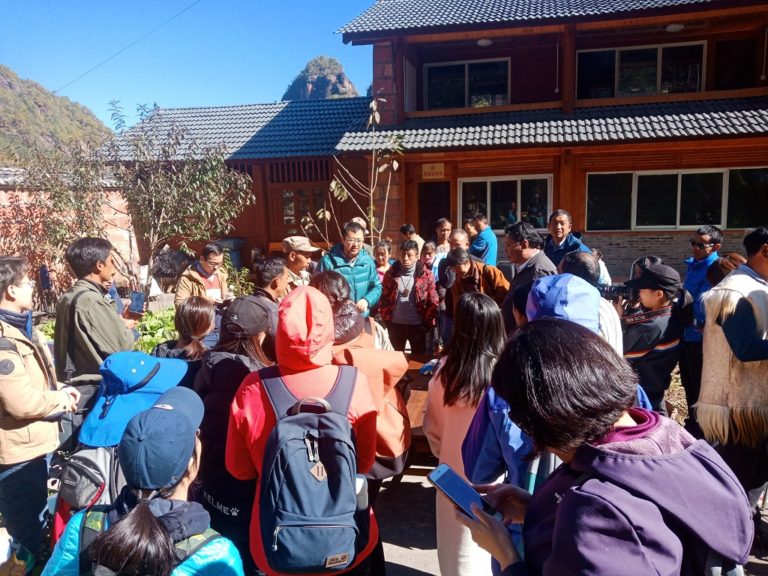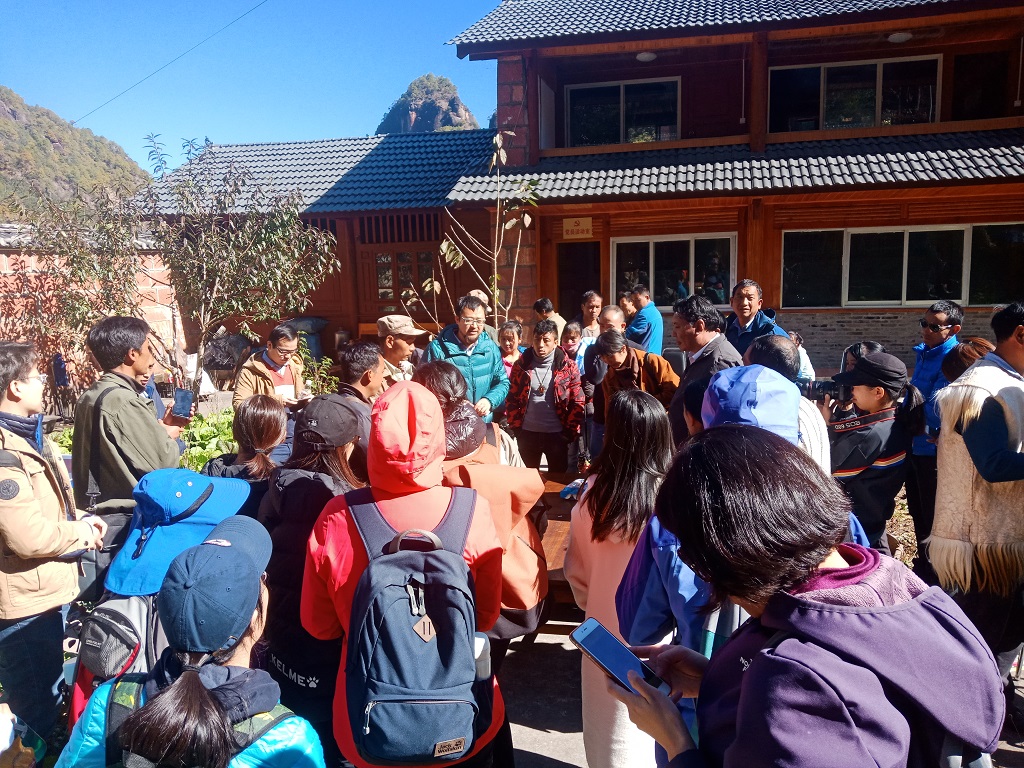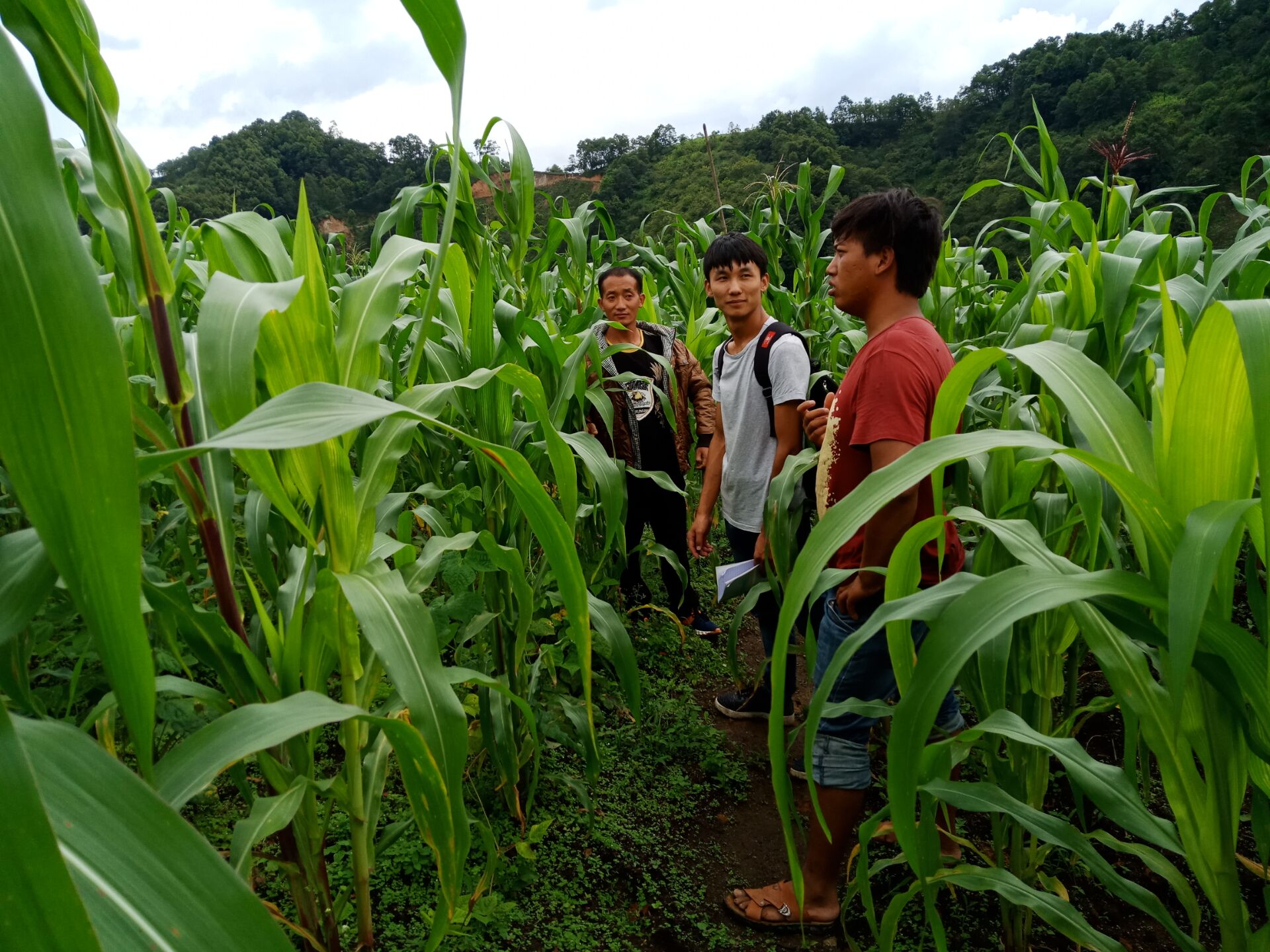
Written by Dianwu Fang, Xingyun Lake Waterkeeper; translated by Waterkeepers China Communication Associate Katherine Olson
In June of 2018, after an intensely competitive process, Xingyun Lake Waterkeeper and host organization Kunming Chuangyi Ecological Protection Research Institute undertook a United Nations Development Program/Global Environment Fund Small Grants project—the “Further Protecting Gaoligong Mountain’s Nujiang Golden Monkeys through a Community Nature Preserve” project. The project, which will run for two and half years, is based in Pianma Village, Lishui City, located in the area where three rivers intersect at Gaoligong Mountains in the northwestern region of Yunnan Province.
Gaoligong Mountain is a biodiversity hotspot: in 1992, the World Wildlife Foundation (WWF) designated it as an A-level wildlife preserve of international significance; in 2000, UNESCO listed it as one of the “World Biosphere Preservation Areas;” in 2003, it was enlisted into UNESCO’s “World Natural Heritage Sites.” The Nujiang Golden Monkey is one of the most endangered primates in the world, and over 500 of them—more than half of their total global population—live at the project site.
The project started in July of 2018. Government representatives, village representatives from four local villages of Pianma town, Lushui city, and our project staff attended the project kickoff meeting and toured Pianma and Piansihe villages where they held a mobilization meeting, which attracted 118 village representatives. In October, once the project funds were received, a protection mechanism gradually emerged for protecting the Nujiang Golden Monkeys and their habitat area: project staff set up digital cameras and infrared cameras, villagers conducted patrols and species assessments, and a standardized management system was put in place for agricultural chemicals to prevent previous habits of casually and randomly using pesticides, fungicides, and weed killers. In addition to these efforts, project staff set up tourism routes, planted trees, came up with innovative ways to acquire revenue, encouraged villagers to switch from relying upon logging and hunting to a new ecological economy lifestyle, set up a community seed bank, and ensured overall effective management and benefit sharing in order to keep the project developing and building upon itself long-term.
In November of 2018, UN Development Program ran a “Community Wildlife Preserve and Internally-Driven Community Development” workshop in Lijiang, Yunnan, during which project staff from various nature preserves explained their methods and experiences in villager self-governance, cohesive community cultivation, conflict resolution, and more. After the workshop, representatives saw an operation demonstration of Hexiazu Village’s mutual aid and cooperation bank program and learned about Liguang Village’s accomplishments in garbage treatment, rural co-ops, ecological tourism on Laojun Mountain, white kidney bean planting, and other projects.
The project is progressing systematically. Our project staff plans to visit local sites this April or May for further assisting villagers to complete self-governance rules on their community Nature Preserve. We are looking forward to a scenario in which remote rural villages achieve a “win-win” between environmental protection and economic productivity, and hope that such projects will soon be a common sight in the near future.
社区保护地促进高黎贡山怒江金丝猴保护
经过激烈角逐,2018年6月我们承接了联合国开发计划署/全球环境基金小额赠款项目——社区保护地促进高黎贡山怒江金丝猴保护项目。项目地在滇西北三江并流区高黎贡山的泸水市片马镇,项目期两年半。
高黎贡山是生物多样性热点地区之一,1992年被世界野生生物基金会(WWF)评为具有国际重要意义的A级保护区;2000年被联合国教科文组织列为“世界生物圈保护区”;2003年被联合国教科文组织世界遗产委员会列入《世界自然遗产名录》。怒江金丝猴是最为濒危的灵长类动物之一,项目地怒江金丝猴500多只,占全球数量的一半以上。
2018年7月项目启动,泸水市、片马镇及下属四个村子的相关部门负责人、村民代表及项目人员等十余人参会并考察了片马村和片四河村,在片四河村召开了118名村民代表参加的动员会。10月项目款到位后,围绕怒江金丝猴及其栖息地保护,逐步建立起了社区保护地机制:发放数码相机、红外摄像机,村民开展野外巡护、物种监测;实施农业化学品统一管理,改变原有的随意使用杀虫剂、杀菌剂和除草剂的行为习惯;规划旅游路线、林下种植,创新营收方式,推动村民仅靠伐木狩猎生存向生态经济方式转变;创建社区种质库,完善管理、分享惠益,为社区长远发展积蓄后劲。
2018年11月联合国开发计划署在丽江召开了“社区保护地与内生式社区发展工作坊”,各自然保护地的项目人员介绍了在村民自治、培育凝聚力、解决争议等方面的作法和经验。会后代表们参观了河下组村村民互助的村寨银行的运营演示,以及黎光村在垃圾处理、农村合作社、老君山生态旅游、白芸豆种植等方面取得的业绩。
截至发稿日,本项目活动正有条不紊地推进,我们期待这些来自边远农村的环保与生产生活双赢的局面,在不远的将来其他地方也常见。

